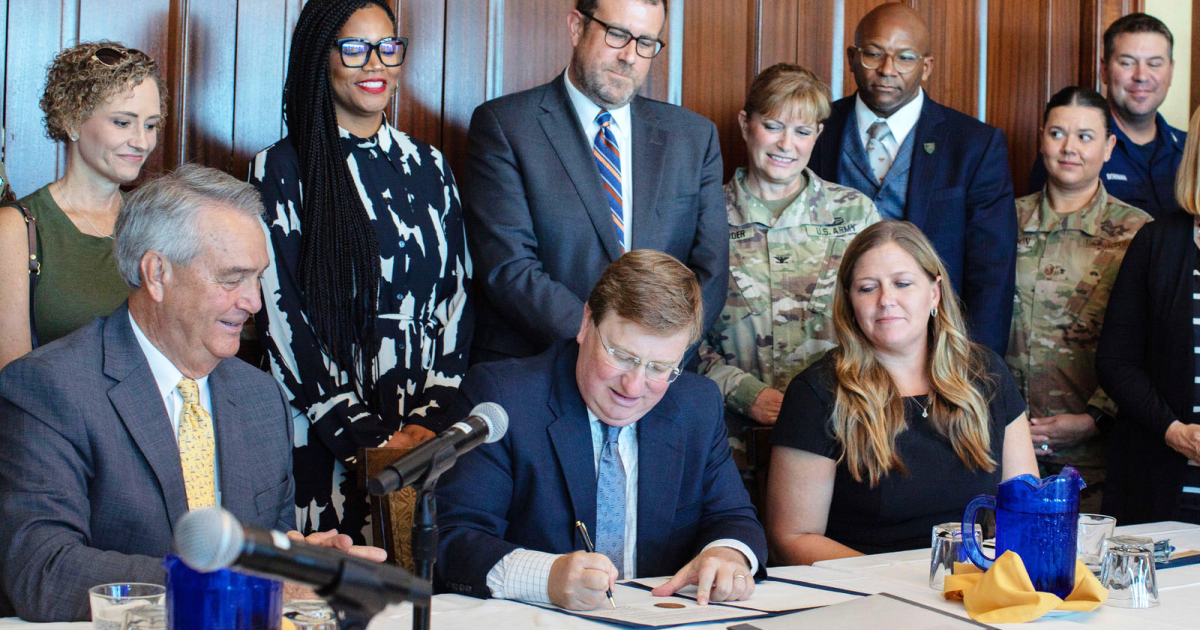2 MIN READ
Virginia Voters Overwhelmingly Support Military Spouse License Portability
.png)
Every year, military families are relocated across states in the U.S. These moves come with a series of obstacles for military families: finding new employment, settling into a community, and more. Systemic barriers like time-consuming licensing and employment regulations cause military spouses to delay returning to work, creating a financial burden. Our partner, Merit, in collaboration with Embold, surveyed Virginia voters to unpack their perceptions and support of military reciprocity and portable licensing. Let’s explore the results that will shape how states must navigate military reciprocity.
Single-state licenses challenge our military families
Nearly fifteen percent of military spouses move their families across state lines yearly – compared to one percent for civilians.
Eighty-three percent report complications with obtaining license transfers that significantly lengthen the time it takes to find employment and financial stability.
Most professional and many occupational careers in healthcare, education, transportation, finance, and many other professions require specific training, experience, and regularly renewed licenses for an individual to work in those positions legally. States issue the majority of licenses.
Even though the responsibilities of these careers may only vary slightly from state to state, almost each one requires its own individual license. Applying and qualifying for new credentials can be lengthy and complicated. Some states require additional hours of training, education, or job experience to do the same work.
Spouses often wait weeks or months for individual licensing boards to process their mutual recognition requests - during which time they can't earn a living. Since our military families often rely on the civilian spouse as the primary breadwinner, waiting to return to work leads to critical financial instability.
New Virginia study reveals broad support for license reform
Knowing that licensing reciprocity is essential to the resilience of military families, prompted the need for a group of advocates, public officials, and veterans to form the Alliance for States Providing Interoperable Reciprocity (ASPIRE). We at ASPIRE are a coalition focused on advancing portability and encouraging states nationwide with reciprocity to implement these reforms.
In May 2023, a survey was conducted by Embold Research and ASPIRE Coalition partner Merit on 808 Virginia registered voters to gauge their perceptions of and support for the reciprocity of professional licenses across states. The results demonstrate overwhelming bi-partisan support for this initiative.
Almost 80% of surveyed Virginia voters support license reciprocity.
Other critical findings include that one-third of participants believe their military neighbors experience financial instability to the point of frequently struggling to pay their bills.
Their Virginia survey also shows voters:
- Are convinced military families experience financial instability
- Strongly support recognizing military spouses' out-of-state licenses
- Believe their local economy will improve because of license reform
To adopt and implement licensing portability, states need digital solutions
With clear support and the promise of improved local business success, why are so few states adopting or implementing reforms? 34 states have already passed legislation, but even then, advances in improving the process, such as digitization of credentials or clear pathways to simplify their transfer, have yet to be funded or begun.
Besides political opposition from some organizations, states may hesitate to adopt reciprocity because they don't have the technology needed to make portable and transferable licenses a reality.
Modern verified digital licensing systems would replace siloed systems and enable states to:
- Map all participating states' licensing requirements
- Share these requirements with military spouses
- Verify and share existing licenses in real-time with the state where the applicant resides
- Guide program participants and track their documentation process
- Issue a portable digital record of successful license recognition
Will your state be the first to cross the reciprocity finish line?
Virginia survey participants shared their strong desire to see military spouses and veterans return to work in their licensed professions as quickly as possible through credential reform.
The states that lead the way in granting and recognizing reciprocal licenses will drive economic growth for their communities and, most importantly, improve the lives of military families.
Download the Embold and Merit infographic today and see how voters feel about license reform.





